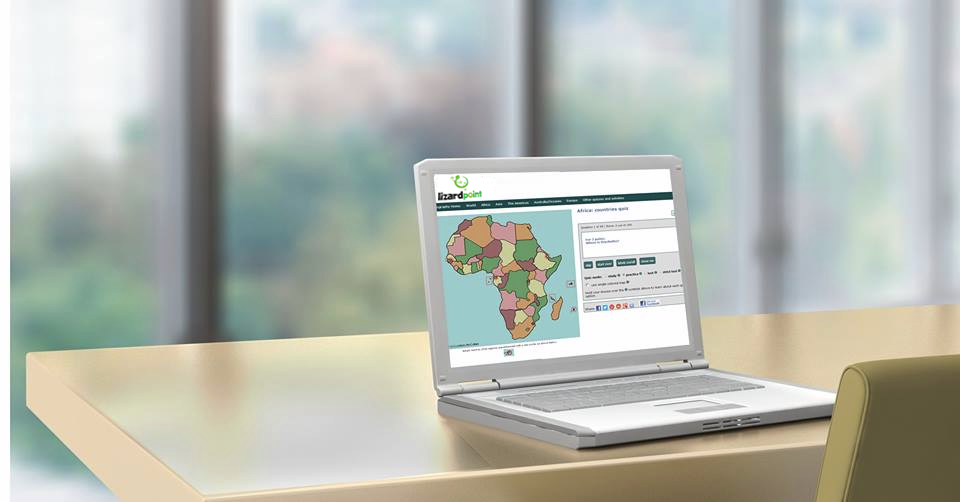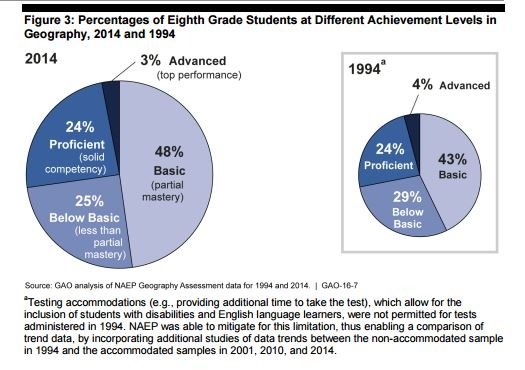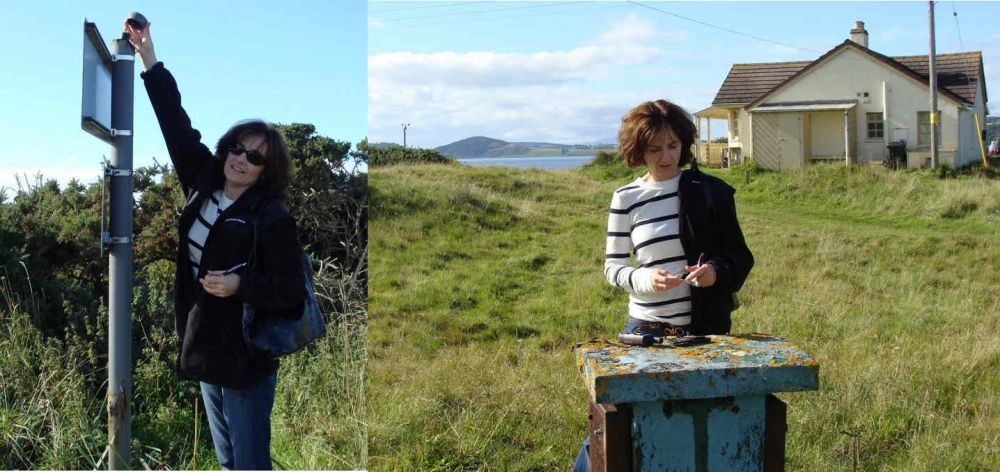Oct 222015We announced a quiz of the whole world the other day (see our Oct 19 blog post), and feedback told us, there were just too many navigation clicks required to answer the questions. So we put together a new quiz - based on work we had already done for that one as well as the much older one with the slider bar - and we came up with what we hope is finally a solid solution.
In our latest quiz, you can answer many of the questions without leaving the world map. And if you can't answer on the world map, you can click a magnifier to get to an enlarged continent or region map.

As with the previous version, once in a continent map, you can use one of 3 ways to return to the world map, and there are no points lost for moving around.

Please give the quiz a try and leave us some feedback here!
Oct 212015The use of technology by teachers is an subject of great interest to the Lizard Point team. Obviously, we would like to make Lizard Point Quizzes even better; easier to use for teachers and students, more engaging and able to impart real learning about our world. But beyond that, we strongly believe that our kids are going to be increasingly living in a 'digital world', and their experience in the classroom should reflect and prepare them for that reality.

In researching this post, we came across several articles about the use of technology in the classroom that were rather disappointing. Several of them were summarized in Why Ed Tech Is Not Transforming How Teachers Teach by Benjamin Herold in Education Week in June, 2015. We took away a couple of key points from this article:
- By and large, we have gotten past 'first order' challenges with adaption of educational technology such as lack of internet connectivity and access to technology. As evidence, the report mentions 75% of high school students reporting regular use of smartphones or tablets in the classroom.
- However, 'second order' challenges are significantly hindering progress. These are reportedly mostly concerned with teacher attitudes, training, administrative support and knowledge.
"The introduction of computers into schools was supposed to improve academic achievement and alter how teachers taught..", according to Stanford University education professor Larry Cuban, ".. neither has occurred". The article goes on to describe technology adaption in the classroom as incremental and more likely to be related to helping teachers teach (ie. powerpoint vs. overheads) than in how students learn. Some good counter-examples are also cited, involving early adapters that have managed to create student-driven, collaborative learning opportunities. But these are definitely presented as the exceptions.
Based on the feedback we receive at Lizard Point, we are convinced that many, many teachers have found ways to use educational software to help students learn (and hopefully not create more work for themselves). We would love to hear from any teachers about their approaches to technology and how they have overcome challenges. Please send us a note or leave a comment. Perhaps we'll find some approaches that we can feature in a later post.
Also, if you have thoughts on ways that software could improve - we'd love to hear that as well. What if we had educational software that engaged kids the way that their video games do? What if they could collaborate and compete with their classmates in a visually stimulating way? What would that look like, feel like?
Oct 192015NOTE: Since publishing this, we came up with an even better world quiz! Go to our blog entry to read about it.
We get a lot of requests for a quiz of the whole world. And we've struggled with this for over a year. Why? Two reasons - would anybody REALLY have the patience to answer over 190 questions? And how would this really work, technically speaking, because many of the countries would be too small to click on. And no, we can't implement a zoom in/out technology like Google maps uses... it just flat out won't work with the way our quizzes are coded.
We tried a whole world quiz a while back that incorporates a slide bar to move yourself through the world, thus avoiding the difficulty of clicking on something really small. But it doesn't work on touch screens.
But we might be getting close to a solution, and we'd like your feedback.
We've created two quizzes you can try out - one is a 197-question quiz of the sovereign countries, the other is a more manageable 30-question quiz on the countries with the greatest population.
There's a bit of extra navigation that happens with this style of quiz: you start at a map of the continents, and you must select one before you answer the question. Sometimes, after you've answered a question, the next random question is conveniently in the same continent. Often, it's not, and you have to navigate back to the world map to pick another continent.
There are 3 ways to get back to the world map:

We'd love your feedback... try one or both of the quizzes and leave us a comment below, or send us an email. Just, please, don't suggest that we use zoom in/out maps, because technically, it's not going to work.
If all goes well and people like this style of quiz well enough, we'll make it customizable, and you'll be able to create world quizzes with the countries of your choosing.
Oct 182015We try to pay a lot of attention to news about geography education. And on some days, it can be downright depressing. USNews just released an item entitled, U.S. Students Are Really Bad at Geography. The article discusses a new report from the Government Accountability Office with findings that likely explain persistent poor showings on the NAEP Geography Assessment results.

The results reported are dismal. Almost 3 in 4 eighth grade children tested as below proficient in geography - a result that shows no improvement in 10 years. And the most recent results for 4th and 12th grade students are even worse. Sigh.
The explanation that came out of the Accountability Office is simple - geography is being squeezed out of the curriculum. The report finds that more than half of social studies teachers spend 10 percent or less of their time on geography. In fact, a majority of states do not even require a geography course in middle school and even less require a geography course to graduate high school. This is partly due to heavy emphasis placed at both the national and state levels on other subjects such as reading, math and science.
The other factor mentioned is a lack of support at the classroom level for teachers. This includes preparation time, professional development and a lack of geographic technology in the classroom.
Over the last few years, we've communicated with hundreds of teachers in the US that are using Lizard Point to help make geography accessible and relevant and engaging to their kids. These teachers understand the importance of geography as critical context to a child's development. And the best ones manage to integrate geography as an aspect of a world view into all of the social studies they teach. This integration of geography into overall learning is a theme that interests us greatly as we plan new features in our site. We believe this is important. The world we share is shrinking and a global understanding is critical for tomorrow's citizens.
Oct 162015We noticed an article in our feed a few months ago and thought that our readers would appreciate it. We presume you already know that geography is incredibly interesting. It's a discipline that actually makes you think outside of your own environment and relate other places, peoples and cultures. You can't really be passionate about geopgraphy without being an open-minded thinker with an 'inner-eye' that's forever looking at the horizon.

The article is from the UK and takes a slightly tongue in cheek look at the reasons that you might want to explore this subject in college and into your career. But, underlying their "10 reasons why geography is far and away the best subject to study at university", is a really important point...
Geographers are quite employable. We've highlighted elsewhere the US Bureau of Labor Statistics that project a 29% increase in this occupation. Here's another study in the UK of a recent graduating class, that shows that geography majors have one of the lowest unemployment rates of all discipines. This is attributed to a few reasons;
- Studying geography provides graduates with a mix of skills employers want to see.
- Geography students tend to have a more flexible career path than other subjects with higher unemployment statistics.
- Geography graduates flexibility opens up possibilities in industries with increasing numbers of vacancies.
Okay, now lets look at a few of the lighter reasons that you will want to study geography in college according to Huffington Post, UK:
- No-one really knows what you study
- You get to go on loads of field trips
- You have the life of an arts student
- Geographers are the most fun
- You get to do a bit of everything
- You're not geologists
- Your dissertation can actually be interesting
- Because you've always wanted to be a geography teacher
- Everyone loves volcanoes
- Because everyone loves colouring in
By all means, take a look at the article to see if you agree with the thinking behind these advantages. (But keep the 'very employable' thing in mind too!)
Oct 112015We discovered geocaching quite few years ago. For us at Lizard Point, it was the perfect combination of geography, nature, technology and general geekiness. It also gave us a fun, cheap, and easy way to engage our kids when they were young. In looking for an item of interest to geography teachers, I went searching for examples of integrating it into lesson plans. Reading the piece, A geocaching treasure hunt helped my students learn about the landscape in the Guardian, by teacher Stephen Lockyer, made me think that this idea has occurred to a few of you.

In case you haven't geocached - it's really simple. Go to the official website and get a free account. In five minutes you can bring up a map of your neighbourhood and find pointers to caches that others have hidden away. I bet you'd find 10 within walking distance. You then note the GPS coordinates and you start your hunt. It's even easier if you just download the free app to your smartphone. After some trekking around and (perhaps) peeking at clues - you'll discover the cache. It will always contain a log and often some little trinkets. The idea is to sign the log, exchange some trinkets if you like, and record the find with the app.
Stephen worked geocaching into an outing that he had already planned and was able to integrate map reading into the lesson. His class was so engaged that they began a program to create and hide geocaches in their own neighbourhood after the field trip.
As the photos illustrate, our family always includes some geocaching when we're on holiday. These were taken on a beach in Scotland. And I can almost guarantee that you'll find some sights off the beaten path and well worth the hunt.







